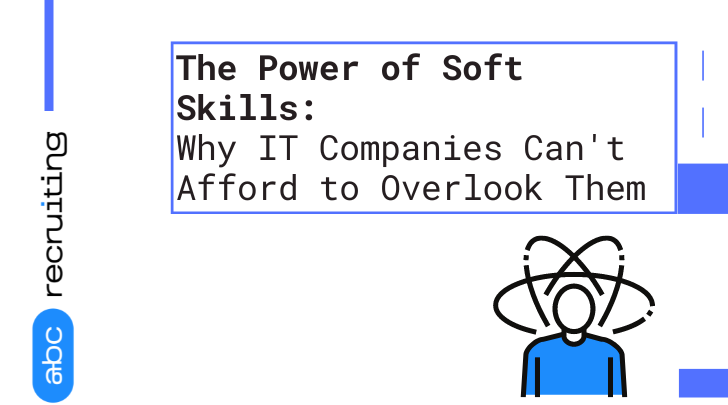Hello and welcome to our article on the importance of soft skills in IT recruitment! As an IT recruiting agency based in Canada, we know firsthand how important it is for IT companies to not only focus on technical skills but also on the soft skills of potential candidates. In this article, we'll discuss why soft skills are important, what specific soft skills IT companies should look for, and how to assess them during the recruitment process.
The importance of soft skills in IT
First, let's start with why soft skills are important in IT recruitment. While technical skills are certainly important, they aren't the only factor that contributes to a successful IT team. Soft skills, such as communication, teamwork, adaptability, and problem-solving, are equally important. A candidate with excellent technical skills but poor communication or teamwork abilities can hinder the success of the entire team. Soft skills are what make a candidate a well-rounded and effective member of a team.
So, what specific soft skills should IT companies look for? Let's break it down:
- Communication: In IT, communication is crucial, especially when working on projects with multiple team members or clients. Look for candidates who can clearly articulate their ideas, listen actively, and provide feedback in a constructive manner.
- Teamwork: The ability to work effectively in a team is essential in IT, where projects often require collaboration between different departments and teams. Look for candidates who can work collaboratively, respect others' ideas, and contribute to a positive team environment.
- Adaptability: IT is a rapidly changing industry, and it's essential to have team members who can adapt to new technologies, processes, and workflows. Look for candidates who are willing to learn new things and can adapt quickly to change.
- Problem-solving: In IT, problem-solving is a key skill, as many projects involve troubleshooting and finding solutions to complex issues. Look for candidates who can think critically, identify problems, and come up with effective solutions.
Assessment of soft skills during the recruitment process
Now that we've identified the important soft skills to look for in IT candidates, how can we assess them during the recruitment process? Here are a few tips:
- Ask behavioral questions: During interviews, ask candidates to describe how they've handled specific situations in the past that require the soft skills you're looking for. For example, ask about a time they had to work with a difficult team member or solve a complex problem.
- Use assessments: There are many online assessments available that can measure a candidate's soft skills, such as emotional intelligence or teamwork abilities. These assessments can provide valuable insights into a candidate's soft skills.
- Check references: When contacting a candidate's references, ask specifically about the candidate's soft skills. Ask for examples of how the candidate demonstrated strong communication, teamwork, or problem-solving skills.
But don't just take our word for it. Steve Jobs, the co-founder of Apple, once said, "It's not about money. It's about the people you have, how you're led, and how much you get it." Jobs recognized that the success of a company depends on its people and their ability to work together. Soft skills are what enable people to work together effectively and efficiently, making them essential for any organization that wants to succeed.
The McKinsey Global Institute's report underscores the importance of soft skills in the modern workforce and suggests that these skills will become even more critical in the years to come. As technology continues to transform the workplace, workers who possess strong soft skills will be best positioned to thrive and succeed.
Fact about soft skill
Interestingly, in addition to the benefits of soft skills in the workplace, developing these skills can also have positive effects on an individual's personal life. Soft skills such as communication, empathy, and conflict resolution are essential for building and maintaining healthy relationships with family, friends, and loved ones. By working on these skills in the workplace, individuals may find that they are better equipped to handle challenging situations in their personal lives as well. Additionally, developing soft skills can lead to increased self-awareness and emotional intelligence, which can have long-term benefits for personal growth and wellbeing. In this sense, developing soft skills is not only important for career success but can also contribute to a more fulfilling and satisfying life overall.
Conclusion
In today's fast-paced and ever-changing IT landscape, it's more important than ever to hire people who have both the technical skills and the soft skills needed to succeed. By focusing on soft skills during the recruitment process, IT companies can build strong, effective, and collaborative teams that can tackle any challenge thrown their way. So, as you're looking for your next IT specialist, don't forget to consider their soft skills along with their technical skills. Your team's success may depend on it!




